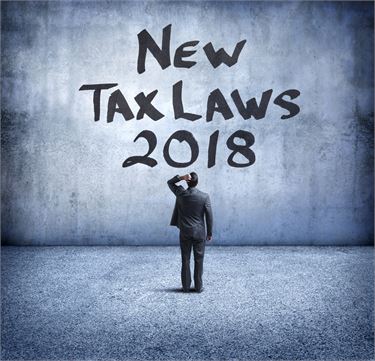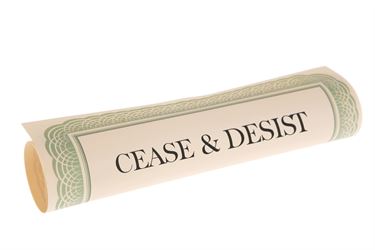
FROM OUR MANAGING PARTNER
Spring 2018 Newsletter
FROM OUR MANAGING PARTNER
Spring 2018 Newsletter
Our Spring has been very eventful. Although weather and world events can be unpredictable, all of us at Golan Christie Taglia continue to stay abreast of the ever-changing landscape—so that we can provide you the most prudent counsel at all times. This issue of our newsletter contains insight into several topics pertinent to compliance and sound business practice.
HOW THE NEW PARTNERSHIP TAX AUDIT RULES APPLY TO YOU
The Bipartisan Budget Act (“BBA”) rules impact the burden of taxation, and the representation and decision-making authority of a partnership. Learn about these changes affecting partnership taxable years that begin on or after January 1, 2018.
COMPLYING WITH RELIGIOUS GARB LAW AND BINDING NON-COMPETE AGREEMENTS
Does your business understand the Religious Garb Law and have appropriate accommodation policies in place? And, a recent ruling might encourage your company to review its non-compete agreements to ensure that they are not excessively prohibitive.
REASONS TO CONSIDER HIRING A PROPERTY TAX ATTORNEY
Homeowners and business owners alike are accustomed to paying property taxes, but do you understand how the assessments are made, and know how to dispute them if they are unreasonable? James W. Chipman explains why contemplating legal representation is a sensible option.
SHOULD YOU RESPOND TO A CEASE AND DESIST LETTER?
In part two of a two-part series, Beverly A. Berneman discusses whether or not to take action upon receipt of a cease and desist letter. She provides guidelines for the steps to take in preparation in order to determine whether a response is necessary and, if so, which approach best serves your business.
As we prepare for Summer, we want to thank you for allowing us to help you secure those things that are most important to you. Rest assured that we at Golan Christie Taglia remain dedicated to working on your behalf. We hope your summertime is filled with adventure; safe travels!
Stephen L. Golan
PARTNERSHIP TAX LAW ALERT
New Centralized Partnership Tax Audit Rules Announced
PARTNERSHIP TAX LAW ALERT
New Centralized Partnership Tax Audit Rules Announced
New Rules Shift the Tax Burden from the Partners to the Partnership, Change Who Can Represent the Partnership Regarding Matters with any Taxing Authority, and Broaden such Representative’s Decision-Making Authority
 The Bipartisan Budget Act (“BBA”) repealed and replaced the preexisting audit rules with a new set of centralized partnership tax audit and tax litigation rules. The most significant BBA Rule is that any “imputed underpayment” or “partnership adjustment” (collectively, “Partnership Adjustment”) will now be paid by the partnership, not the individual partners/members. The BBA Rules also replaced the role of a “Tax Matters Partner” with that of a “Partnership Representative,” who will have _sole authority_ to act on behalf of the partnership. Additionally, either the partnership or its partners/members (as discussed below) will pay any tax assessed during the tax year in which the audit is _resolved_ (“Adjustment Year”), not the tax year to which the audit is subject (“Reviewed Year”). Taking effect for all partnership taxable years that **begin on or after January 1, 2018**, these new BBA Rules govern IRS tax audits of partnerships, limited liability companies, and other entities and arrangements classified as partnerships for U.S. federal income tax purposes.
The Bipartisan Budget Act (“BBA”) repealed and replaced the preexisting audit rules with a new set of centralized partnership tax audit and tax litigation rules. The most significant BBA Rule is that any “imputed underpayment” or “partnership adjustment” (collectively, “Partnership Adjustment”) will now be paid by the partnership, not the individual partners/members. The BBA Rules also replaced the role of a “Tax Matters Partner” with that of a “Partnership Representative,” who will have _sole authority_ to act on behalf of the partnership. Additionally, either the partnership or its partners/members (as discussed below) will pay any tax assessed during the tax year in which the audit is _resolved_ (“Adjustment Year”), not the tax year to which the audit is subject (“Reviewed Year”). Taking effect for all partnership taxable years that **begin on or after January 1, 2018**, these new BBA Rules govern IRS tax audits of partnerships, limited liability companies, and other entities and arrangements classified as partnerships for U.S. federal income tax purposes.
When are the BBA Rules in Effect?
The BBA Rules are effective for partnership taxable years that begin on or after January 1, 2018. For audits of any taxable years prior to 2018, the prior rules, which provide for the use of a Tax Matters Partner, still apply. As such, a partnership with taxable years prior to 2018 will need to address both the Tax Matters Partner and the Partnership Representative in its partnership agreement, while a partnership with only taxable years that begin on or after January 1, 2018 will need to solely address the Partnership Representative in its agreement.
Eligible Partnerships may “Elect Out” (Partner-/Member-Level Taxation)
A partnership may “elect out” of the BBA Rules for any taxable year beginning on or after January 1, 2018 if there are under one hundred “statements” in total (i.e., one statement for each partner/member, whether direct or indirect, and one statement for each shareholder of a Subchapter “S” corporation), and all partners/members are:
- Individuals;
- Subchapter “C” corporations;
- Subchapter “S” corporations;
- Foreign entities that would be treated as Subchapter “C” corporations if they were domestic entities;
- Estates of deceased partners/members; or
- Other persons or entities that may be identified in future IRS guidance.
A partnership may not “elect out” if any partner/member is a:
- Trust (including Grantor-Trusts and Tax-Exempt Trusts, both revocable and irrevocable);
- Partnership;
- LLC taxed as a partnership;
- Qualified Retirement Plan;
- Individual Retirement Plan; or
- Other person or entity that may be identified in future IRS guidance.
Any such decision to “elect out” is valid for only one year. If the partnership “elects out,” then the IRS will pass through the Partnership Adjustment to each individual partner/member, but only if it timely files its income tax return.
Electing to “Push Out” the Partnership Adjustment (Partner-/Member-Level Taxation)
 A partnership may also elect to “push out” a Partnership Adjustment to the Reviewed Year partners/members if the election is made by the Partnership Representative within forty-five days of the date that the Notice of Final Partnership Adjustment is issued by the IRS. Upon receipt of a “push-out” election, each Reviewed Year partner/member will have to calculate the additional tax for the Reviewed Year and all intervening years. Any additional taxes must then be reported and paid on a partner’s/member’s Adjustment Year tax return. In addition to such taxes, any applicable penalties and interest would also be collected at the partner/member level, with interest being charged at a rate that is two percent (2%) higher than the interest rate to be applied had the partnership paid the interest itself.
A partnership may also elect to “push out” a Partnership Adjustment to the Reviewed Year partners/members if the election is made by the Partnership Representative within forty-five days of the date that the Notice of Final Partnership Adjustment is issued by the IRS. Upon receipt of a “push-out” election, each Reviewed Year partner/member will have to calculate the additional tax for the Reviewed Year and all intervening years. Any additional taxes must then be reported and paid on a partner’s/member’s Adjustment Year tax return. In addition to such taxes, any applicable penalties and interest would also be collected at the partner/member level, with interest being charged at a rate that is two percent (2%) higher than the interest rate to be applied had the partnership paid the interest itself.
Modifying the Partnership Adjustment (Partnership-Level Taxation)
In the event the partnership decides neither to “elect out” nor “push out,” then the partnership may still be able to modify any Partnership Adjustment at the partnership level. The payments received by the Reviewed Year partners/members would then reduce the Partnership Adjustment at the partnership level. Any such modifications could take into account certain tax rate adjustments and character of income adjustments (e.g., individual tax rate versus Subchapter “C” corporation tax rate; ordinary income versus capital gains). Any supporting information would need to be delivered to the Secretary of the IRS within two hundred seventy days after the partnership receives a Notice of Proposed Partnership Adjustment from the IRS.
Early Election under Section 1101(g)(4) of the BBA (Partnership-Level Taxation)
The IRS issued temporary regulations governing elections to have the BBA Rules apply to certain taxable years beginning before January 1, 2018. Thus, a qualifying partnership may also elect for the BBA Rules to apply to any partnership tax return filed for partnership taxable years beginning after November 2, 2015 and before January 1, 2018. To elect to have the BBA Rules apply to these taxable years, such election must be made within thirty days of the date of notification to a partnership by the IRS, in writing, that a return of the partnership for an eligible taxable year has been selected for examination.

Annual Requirement to Designate the Partnership Representative
In contrast to the prior rules, under the BBA Rules there will no longer be a “Tax Matters Partner” that is designated to handle audit matters with the IRS for taxable years beginning on or after January 1, 2018. Instead, a Partnership Representative must be designated for the partnership, which will possess sole and exclusive authority to act on behalf of the partnership and bind all partners/members. (Note: If not designated by the partnership, the IRS, not the partnership, will select the Partnership Representative itself.) Each partnership agreement or operating agreement should consider the appointment, resignation, and replacement of its Partnership Representative. Partners/members should consider inserting additional provisions into their partnership agreement to address the new role of the Partnership Representative, including the following: (i) the Partnership Representative’s duties and obligations to the partners/members; (ii) the partners’/members’ obligations to the Partnership Representative; and (iii) the indemnification of the Partnership Representative against any liability with respect to the partners’/members’ proportionate share of the Partnership Adjustment.
The Partnership Representative must be a designated individual (although the Partnership Representative itself may be a legal entity); however, the Partnership Representative does not have to be a partner/member, it instead must only be someone with a substantial presence in the United States.
Tips for Ensuring Compliance
Golan Christie Taglia LLP recommends that all partners/members in partnerships (including limited liability companies and other entities and arrangements classified as partnerships) amend their respective agreements to address the new BBA Rules, which will affect all partnership taxable years that begin on or after January 1, 2018, and to consult with an accountant regarding such amendments to the Internal Revenue Code.
TO LEARN MORE . . .
The corporate law & governance and tax attorneys at Golan Christie Taglia LLP provide day-to-day business counseling and planning advice on a wide range of issues that face companies, including all aspects of partnership compliance. If you have questions or need additional information, please contact Donna F. Hartl at Golan Christie Taglia LLP.

Religious Garb Law
Religious Garb Law

In 2017, Illinois amended its Human Rights Act to strengthen protections granted to an employee’s sincerely held religious beliefs. The amended statute, known as the Religious Garb Law, prohibits an employer from taking action that would cause an employee to “violate or forgo a sincerely held practice of his or her religion including but not limited to, the wearing of any attire, clothing, or facial hair in accordance with the requirements of his or her religion.” These beliefs could affect an employee’s ability to work on certain days or times, work with certain foods or products, engage in prayer, attend worship services, or observe religious holidays. Additionally, an employee might need to display religious objects or markings, refrain from participation in certain activities at work, and/or wear certain garments.
An employer must reasonably accommodate an employee’s religious beliefs unless it would cause undue hardship to the employer’s business. These accommodations could include flexible scheduling, shift swapping, job reassignment, permitting the employer’s facility to be used for religious activities, and exceptions to dress or grooming policies. However, employers can still have a dress code or grooming policy that restricts attire, clothing, or facial hair in order to maintain workplace safety or food sanitation. Employers must post a summary of the Religious Garb Law’s protections in a conspicuous location. Please contact the vendor that provides your required employment posters to obtain an updated poster.
Employer’s Non-Compete Agreement Rejected by Court
Employer’s Non-Compete Agreement Rejected by Court

In a surprising decision, a federal court in Illinois recently determined a frequently used clause in non-compete agreements was overly broad. In Medix Staffing Solutions, Inc. v. Dumrauf, the court found that a clause prohibiting a former employee from taking any position with another company that engaged in the same business as his former employer was overly restrictive. The court found the clause improper because it failed to consider what services the employee actually performed for his former employer or whether his new employer was really a competitor. The court was concerned that the clause could prohibit employment with a company that was not actually a competitor finding it wrongfully prohibited the employee, “from taking any number of more plausible roles at another industry player, no matter how far removed from actual competition with [his former employer].” Rather than judicially modifying the agreement to be more reasonable, the court threw out the entire agreement.
In light of this recent ruling, Golan Christie Taglia LLP recommends that companies review their existing non-compete agreements to ensure that they are reasonable and narrowly tailored to protect the company’s business interests without excessively restricting a former employee from finding future employment. Some factors to be considered include the length of the non-compete, the geographic area, and the scope and purpose of the non-compete.
If you have questions or need additional information, please contact an employment attorney at Golan Christie Taglia LLP.
PROPERTY TAX ASSESSMENT LAW
5 Reasons to Hire a Property Tax Attorney
PROPERTY TAX ASSESSMENT LAW
5 Reasons to Hire a Property Tax Attorney
From understanding complicated laws to knowing how to dispute exorbitant assessments, having an expert on your side can ensure you’re not overpaying when it comes to property taxes.
Property taxes affect us all, whether we’re paying them directly or receiving services or benefits covered by the tax. That’s especially true in Illinois, where property taxes are the 2nd highest in the nation, behind only New Jersey.*
As the owner of a home or a business, your taxes help pay for education, public safety, infrastructure, emergency response and a variety of social services. But you don’t want to pay more than necessary, something a property tax assessment attorney can ensure by considering the following factors:
-
Illinois reassessment begins Jan. 1, 2019 — Township assessors are required by law to view, inspect and reassess each property in their jurisdiction once every 4 years. In Cook County, property is reassessed every 3 years. The City of Chicago will be reassessed in 2018. Reassessments ensure assessments are fair and equitable on a countywide basis—given there are typically more individual changes made in general assessment years, significant increases often occur.
-
Vague, complex tax laws — Frequent changes in these laws only compound the problem. Different interpretations can create legal uncertainty and possibly result in different tax consequences for property owners.
-
Different assessments for businesses vs. residential properties — In Cook County, businesses are assessed at 25% of market value, while single-family homes and multi-family properties are assessed at just 10%. Businesses can be singled out and experience higher tax burdens than residences.
-
Inconsistent, subjective and unknown methods of valuation — Some assessing officials use a “mass appraisal” approach in which a large number of properties are valued simultaneously using standardized procedures. However, one size does not fit all. Many properties are not typical and require special individualized attention.
-
Ability to challenge unfair and excessive assessments — Taxpayers who wish to appeal their assessments have several options. Each option, however, comes with its own set of deadlines. One common mistake many taxpayers make is to wait for the tax bill to arrive in the mail. By then, appeal periods have expired and the only recourse is to pay the tax and wait until the following year to file an appeal.
A property tax attorney can represent you in all stages of the property tax appeal process, from the research, preparation, and filing to representation before the assessor and local and state boards. The benefits of having an expert on your side heavily outweigh the cost of service, or even worse, the potential cost of making a mistake.
The bottom line is this: hiring a property tax attorney is the best way to make sure you pay your fair share—and no more.
*Source: Chicago Tribune, April 5, 2018

Part II of a two-part series; Part I was featured in GCT Winter 2018 Newsletter
WHAT TO DO (OR NOT TO DO) WHEN RECEIVING A CEASE AND DESIST LETTER
Part II of a two-part series; Part I was featured in GCT Winter 2018 Newsletter
WHAT TO DO (OR NOT TO DO) WHEN RECEIVING A CEASE AND DESIST LETTER

Cease and desist letters are pretty self-explanatory. They are letters that demand the recipient stop taking actions that interfere with the letter writer’s rights. A cease and desist letter is not a legal document. But it is a notice that a claimant feels something is wrong with what the recipient is doing. It could lead to a lawsuit. But not automatically.
The following is a guide for what to do (or not to do) if you receive a cease and desist letter about an intellectual property dispute.
Don’t panic. No question that there’s a sinking feeling when receiving one of these letters. That is a natural response. But, the cease and desist letter doesn’t automatically mean that you have done anything wrong. More often the letter is from the claimant’s attorney. So the letter is the attorney’s opinion, based on the claimant’s perspective, that you did something wrong.
Don’t communicate, yet. Most likely, the letter will give a deadline for responding. Take advantage of the time. Don’t reach out to the claimant’s attorney immediately after receiving the cease and desist letter. Attorneys have professional responsibility rules that govern communications with a non-attorney respondent. But any communications with the claimant’s attorney could be used as evidence against you if the matter ends up in court.
Determine what claims are being made. Read over the claims in the letter carefully. Is the letter about copyright, patent, trademarks or trade secrets? A cease and desist letter can also claim unfair competition, defamation or breach of contract. The claims can overlap. For instance, trademark infringement can give rise to unfair competition claims. Or patent infringement can also involve breach of a patent license. If the claims involve a new employee, employment law issues can also be involved.
Gather and preserve your records. Gather up any documentation that exists about the claims, including letters, memoranda, creation notes, studies, etc. Once the documentation is located, preserve it and don’t touch it. Don’t destroy backup copies. Don’t disturb current versions. Don’t copy, e-mail or send information to anyone.
Talk to an attorney. Legal advice plays an important part in dealing with a cease and desist letter. Many cease and desist letters contain legal arguments and cites to statutes. A good attorney will review your records and the cited legal and authority to help determine whether the claims have merit. Then, the attorney can help determine the best course for handling the cease and desist letter.
 Work with your lawyer to prepare a response. There is always a temptation to ignore the cease and desist letter that appears to have no merit. But that could be a dangerous path. In all but extremely rare circumstances, a response is necessary. Your attorney can help craft the appropriate response. There are a number of ways to respond to a cease and desist letter. Sometimes, a response can be a phone call to the claimant’s attorney. The response can also be a request for further information to evaluate the claim. Or the response can be a full analysis of the facts and legal basis supporting the recipient’s position. If the claims have no merit whatsoever, then the response should be carefully crafted to point out the lack of merit of the claims.
Work with your lawyer to prepare a response. There is always a temptation to ignore the cease and desist letter that appears to have no merit. But that could be a dangerous path. In all but extremely rare circumstances, a response is necessary. Your attorney can help craft the appropriate response. There are a number of ways to respond to a cease and desist letter. Sometimes, a response can be a phone call to the claimant’s attorney. The response can also be a request for further information to evaluate the claim. Or the response can be a full analysis of the facts and legal basis supporting the recipient’s position. If the claims have no merit whatsoever, then the response should be carefully crafted to point out the lack of merit of the claims.
Deal with the merit (lack of merit) to the claims. There are degrees of merit. If the claimant has a right that has been clearly violated, negotiations can be far more economical and less painful than trying to defend claims for which there is no defense. If the merits of the claims are far from clear, negotiations need not be a capitulation. Negotiations should be used to preserve your rights as well as the claimant’s rights.
Don’t use social media as a forum. Social media is a court of public opinion and not a court of law. It is not an appropriate forum for resolving a cease and desist letter. Further, anything posted on social media can be used as evidence against you. Better to stay mum.
Be prepared to fight if you have to. If the matter can’t be resolved through negotiations, then you need to make a decision, namely, fight or capitulation. A fight can mean a lawsuit. It’s best to consult with your attorney about the projected costs of defense. Even if you decide to capitulate, your attorney can help minimize the sting.
Evaluate. No matter the path taken, you should evaluate whether your business is vulnerable to future attacks. Golan Christie Taglia’s attorneys offer Intellectual Property audits and reviews of business practices, websites, content creation, etc. The audit and review will give you the assurance that you have taken a positive step to protect your business from future cease and desist letters.




